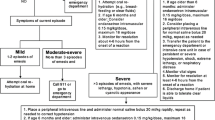Abstract
Trimethylaminuria (TMAU) is an autosomal recessive disease caused by excessive excretion into body fluids and breath of unoxidized trimethylamine (TMA) derived from the enterobacterial metabolism of dietary precursors. The condition is caused by deficiency of flavin-containing monooxygenase 3 (FMO3) which leads to impairment of hepatic TMA oxidation to the odorless trimethylamine N-oxide. Secondary TMAU is due to substrate overload in individuals with genetically determined reduced enzyme activity. Food protein–induced enterocolitis syndrome (FPIES) is characterized by recurrent episodes of emesis, diarrhea, dehydration, and lethargy after ingestion of offending foods. Its pathophysiology involves local non-IgE-mediated inflammation of the gastrointestinal tract, which leads to increased intestinal permeability. We report on an 8-month-old male who presented with typical episodes of FPIES associated with intense fish-like body odor. Further investigation in our patient revealed massive urinary TMA excretion during acute FPIES presentation and complete normalization between these episodes. The patient was found to be heterozygous for a novel, paternally inherited nonsense p.Tyr331X mutation and for two maternally inherited common polymorphisms, E158K and E308G, in the FMO3 gene. We propose that our patient was able to cope with the daily burden of TMA, but when challenged with substrate overload, he failed to oxidize TMA due to limited reserve enzyme capacity. We discuss the pathophysiology of TMAU and FPIES and suggest potential mechanisms for the clinical and biochemical findings. Our report illustrates the complex interplay of genetic and environmental factors in TMAU and sheds light on the pathophysiology of FPIES.
Competing interests: None declared
Access this chapter
Tax calculation will be finalised at checkout
Purchases are for personal use only
Similar content being viewed by others
References
Al-Waiz M, Ayesh R, Mitchell SC, Idle JR, Smith RL (1989) Trimethylaminuria: the detection of carriers using a trimethylamine load test. J Inherit Metab Dis 12(1):80–85
Cashman JR, Camp K, Fakharzadeh SS, Fennessey PV, Hines RN, Mamer OA et al (2003) Biochemical and clinical aspects of the human flavin-containing monooxygenase form 3 (FMO3) related to trimethylaminuria. Curr Drug Metab 4:151–170
Caubet JC, Nowak-Wegrzyn A (2011) Current understanding of the immune mechanisms of food protein-induced enterocolitis syndrome. Expert Rev Clin Immunol 7(3):317–327
Chalmers RA, Bain MD, Michelakakis H, Zschocke J, Iles RA (2006) Diagnosis and management of trimethylaminuria (FMO3 deficiency) in children. J Inherit Metab Dis 29:162–72
Chung HL, Hwang JB, Park JJ, Kim SG (2002) Expression of transforming growth factor b1, transforming growth factor type I and II receptors, and TNF-a in the mucosa of the small intestine in infants with food protein-induced enterocolitis syndrome. J Allergy Clin Immunol 109(1):150–154
Heyman M, Darmon N, Dupont C, Dugas B, Hirribaren A, Blaton MA, et al. (1994) Mononuclear cells from infants allergic to cow's milk secrete tumor necrosis factor alpha, altering intestinal function. Gastroenterology 106(6):1514–1523
Johnson DW (2008) A flow injection electrospray ionization tandem mass spectrometric method for the simultaneous measurement of trimethylamine and trimethylamine N-oxide in urine. J Mass Spectrom 43:495–499
Koukouritaki SB, Simpson P, Yeung CK, Rettie AE, Hines RN (2002) Human hepatic flavin-containing monooxygenases 1 (FMO1) and 3 (FMO3) developmental expession. Pediatr Res 51:236–243
Leonard SA, Nowak-Wegrzyn A (2011) Food protein-induced enterocolitis syndrome: an update on natural history and review of management. Ann Allergy Asthma Immunol 107(2):95–101
Mackay RJ, McEntyre CJ, Henderson C, Lever M, George PM (2011) Trimethylaminuria: causes and diagnosis of a socially distressing condition. Clin Biochem Rev 32(1):33–43
Mayatepek E, Kohlmuller D (1998) Transient trimethylaminuria in childhood. Acta Pædiatr 87(11):1205–1207
Mehr S, Kakakios A, Frith K, Kemp AS (2009) Food protein-induced enterocolitis syndrome: 16-year experience. Pediatrics 123(3):e459–e464
Mitchell SC, Smith RL (2001) Trimethylaminuria: the fish malodor syndrome. Drug Metab Dispos 29(4 Pt 2):517–521
Phillips IR, Shephard EA [2007 Oct 8 (Updated 2011 Apr 19)]. Trimethylaminuria. In: Pagon RA, Bird TD, Dolan CR, et al (eds) GeneReviews™ [Internet]. University of Washington, Seattle (WA); Seattle, 1993–. Available from: http://www.ncbi.nlm.nih.gov/books/NBK1103/
Shimizu M, Cashman JR, Yamazaki H (2007) Transient trimethylaminuria related to menstruation. BMC Med Genet 8:2
US Database for the Choline Content of Common Foods, 2008. http://www.nal.usda.gov/fnic/foodcomp/Data/Choline/Choln02.pdf. Accessed 5/11/12
Yamazaki H, Fujieda M, Togashi M, Saito T, Preti G, Cashman JR et al (2004) Effects of the dietary supplements, activated charcoal and copper chlorophyllin, on urinary excretion of trimethylamine in Japanese trimethylaminuria patients. Life Sci 74(22):2739–2747
Zhang J, Chaluvadi MR, Reddy R, Motika MS, Richardson TA, Cashman JR et al (2009) Hepatic flavin-containing monooxygenase gene regulation in different mouse inflammation models. Drug Metab Dispos 37(3):462–468
Zschocke J, Mayatepek E (2000) Biochemical and molecular studies in mild flavin monooxygenase 3 deficiency. J Inherit Metab Dis 23(4):378–382
Zschocke J, Kohlmueller D, Quak E, Meissner T, Hoffmann GF, Mayatepek E (1999) Mild Trimethylaminuria by common variants in FMO3 gene. Lancet 354(9181):834–835
Author information
Authors and Affiliations
Corresponding author
Editor information
Editors and Affiliations
Additional information
Communicated by: Johannes Zschocke
Synopsis
Synopsis
Transient massive trimethylaminuria can be associated with food protein–induced enterocolitis syndrome in genetically susceptible individuals. The findings illustrate the pathogenicity and complex interplay of genetic and environmental factors in trimethylaminuria.
Rights and permissions
Copyright information
© 2013 SSIEM and Springer-Verlag Berlin Heidelberg
About this chapter
Cite this chapter
Miller, N.B., Beigelman, A., Utterson, E., Shinawi, M. (2013). Transient Massive Trimethylaminuria Associated with Food Protein–Induced Enterocolitis Syndrome. In: Zschocke, J., Gibson, K., Brown, G., Morava, E., Peters, V. (eds) JIMD Reports - Volume 12. JIMD Reports, vol 12. Springer, Cham. https://doi.org/10.1007/8904_2013_238
Download citation
DOI: https://doi.org/10.1007/8904_2013_238
Received:
Revised:
Accepted:
Published:
Publisher Name: Springer, Cham
Print ISBN: 978-3-319-03460-7
Online ISBN: 978-3-319-03461-4
eBook Packages: MedicineMedicine (R0)




